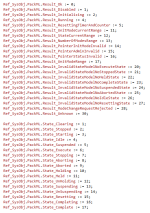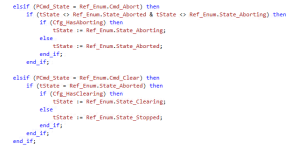keshik
Lifetime Supporting Member
Hi,
I've recently started using Logix/Studio 5000 after a few years of primarily using CoDeSyS based systems. I'm wondering if there is a way to create enumerated tags in Logix.
Example:
I've recently started using Logix/Studio 5000 after a few years of primarily using CoDeSyS based systems. I'm wondering if there is a way to create enumerated tags in Logix.
Example:
- 0 = off
- 1 = on
- 2 = pizza
- 3 = hamburger





